
-- On the wrong side of South Africa's racial divide
by Keith Addison
South Africa, 1974
|
Stories by Keith Addison |
|
Zebra Crossing -- On the wrong side of South Africa's racial divide.
|
| Tai Long Wan -- Tales from a vanishing village Introduction |
|
Tea money |
|
Forbidden fruit |
|
No sugar |
|
Treasure in a bowl of porridge |
|
Hong Kong and Southeast Asia -- Journalist follows his nose |
| Nutrient Starved Soils Lead To Nutrient Starved People |
|
Cecil Rajendra A Third World Poet and His Works |
|
Leave the farmers alone Book review of "Indigenous Agricultural Revolution -- Ecology and Food Production in West Africa", by Paul Richards |
|
A timeless art Some of the finest objects ever made |
|
Health hazards dog progress in electronics sector The dark side of electronics -- what happens to the health of workers on the production line |
|
Mo man tai ('No problem') -- "Write whatever you like" -- a weekly column in Hong Kong Life magazine Oct. 1994-Jan. 1996 |
|
Swag bag Death of a Toyota |
|
Curriculum Vitae |
|
|
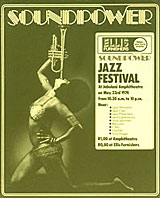 A VIOLENT thump on the back gave me a shock and almost winded me. "Hi!" a black voice said.
A VIOLENT thump on the back gave me a shock and almost winded me. "Hi!" a black voice said.___I swung round to see a short, stocky young wildman with bright eyes, a jutting out beard, knotted hair and a brilliant smile, wearing sandals, a tee-shirt and the most faded, patched, tattiest denims I'd ever seen.
___"Hi, Lefifi Tladi."
___"How're you?" he asked.
___"I've got a sore back." He laughed. "And how're you?" I asked.
___"Umm... partly powerful."
___"Only partly? Didn't feel like it to me. Are we the only ones here?"
___"No, come and meet my friends, they're sitting on the grass over there behind the stage."
___We walked together towards the stage. He swept his arm around: "Look at all this -- this stadium, those seats, all this space: all empty."
___"D'you think it'll stay that way?"
___He looked at me: "Haven't you heard about the soccer?"
___"The Callies-Pirates game?"
___"Yes, it's off."
___"Really? Good, then we'll have a good crowd." The big game would have been competition to the jazz spectacular I'd planned for the people of Pretoria that day.
___"We'll have a big crowd of disappointed soccer fans," Lefifi said, "and they'll all be drunk."
___I groaned. "I suppose you're right."
___"Sure. Hey, who put all that junk on the stage?"
___Someone had pasted dayglo stickers reading "Ellis furniture makes your home smarter" all over the sides of the stage.
___"The sponsors," I said. "They think their name is the most beautiful thing in the world."
___"Why don't we tear it down? It looks shit."
___"Aah... let them have their way." But later I noticed the stickers were gone.
___We passed the stage and joined Lefifi's friends, two men and three women relaxing on the grass with some wine and a bottleneck of dagga. We sat down beside them.
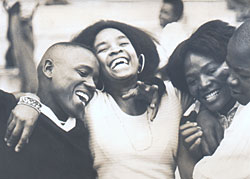 ___I thought of what Lefifi had said about the big game. At least we'd make some money, but soccer fans deprived of their weekend clash would certainly not stay sober for long. Great: twenty thousand drunk blacks and one whitey -- me.
___I thought of what Lefifi had said about the big game. At least we'd make some money, but soccer fans deprived of their weekend clash would certainly not stay sober for long. Great: twenty thousand drunk blacks and one whitey -- me.___Half an hour later we were still the only people there. Then a two-tonner loaded with big loudspeaker boxes clattered into the stadium, stopped at the stage and two white longhairs jumped out -- the sound men. Things looked up -- twenty thousand drunk blacks and me and Terry and Stan.
___The rest of Dashiki, Lefifi's band, arrived and he ran off to unload his drums. I joined Terry and Stan.
___"Sorry we're late."
___"Everyone's late, as you can see."
___"Oh, that's allright then. By the way, have you noticed this railing? It's no good. It's only supported at one end, and it'll fall on top of us when these people start leaning on it."
___I decided not to tell them about the soccer. "Why don't you set up at the back of the stage?"
___"Can't hear anything there. Impossible to balance properly. I must tell you we've done a show here before -- Mamelodi is a heavy scene, it's not like Jabulani."
___They didn't need telling after all.
___My partner, promoter Ray Nkwe, arrived. The crew of black office messengers that the ad agency (our other partner, so to speak) had arranged would handle the gate arrived and set up in the box offices.
___The caterers arrived -- a charity group I'd given the concession to -- and made me breakfast of fried dumplings and coffee.
___The Jazz Ministers arrived, with their 13-year-old pianist Nomvula Ndlazilwane: "She had to get permission from school to miss a hockey match this afternoon." And the Clan, and the Jazz Preachers, wearing purple and yellow satin -- "Baby, ain't I BEAUTiful?" And Batsumi, a tribal jazz band with a witch dancer, led by flautist Tom Masemola, an ex-kwela kid like Jake.
___People arrived. Small groups picnicked on the grass, the stand began to fill.
___Terry got one amp working and played Santana at 500 watts, people swayed to the music.
___Soon everything was ready. About a thousand people were there, we were an hour and a half late, but nobody wanted to play.
___"None of them wants to play first," said Ray.
___"So?"
___"Well then, they can all play first," he said. "You -- you and you -- "
___He chose one or two from each band and they took the stage. The small crowd cheered. The band played Coltrane, and Miles Davis, and then Coleman Hawkins, and combined quite well considering, according to Jeff Mthakathe, who was standing next to me in front of the stage listening.
___Standing that close, we had to shout in each other's ear to be heard above the music. This entailed a series of crouches and cranings, because, though I'm six foot one, Jeff was six foot eight. Watching him disentwine his elongated frame from the equipment in the back of Dashiki's van where he'd been sitting was a sight on its own.
___Most whites were completely unprepared for a huge black detribalised apparition like Jeff. As they dithered in dismay, he made them do astonishing things for him, which made him good at his job -- he worked for the US Embassy's cultural section, making life easier for black artists, sculptors, writers, poets, musicians. The Dashiki workshop was one of his cares.
___Jeff nudged me on the shoulder with his elbow. I craned and he crouched.
___"Hey man, who're those white bosses just came in over there, they friends of your's?"
___I looked: "Ellis bosses, the sponsors -- not friends."
___I went to meet them: Koosie the director, an Afrikaner, short and plump and sleek and smooth and elaborately casual in blue; Colin the promotions manager, tall, thin and craggy in a big flapping Afro shirt and denims; their tame urban Bantu, Mike, the head office chief salesman, camp and dandy and ingratiating.
Sheets of white flame lash from the sky at the world and scorch the oceans down to dry beds of cracked rock.
___Machines smash the mountains, fill the world's holes with the rubble, pack down the surface evenly level, sandpaper it smooth as a billiard ball.
___Other machines cover it with dayglo red, yellow, orange, pink and green linoleum squares a yard wide.
___More machines lay an evenly distributed 63% of the world with 2ft-square purple stickers printed with big black letters:
ELLIS FURNITURE SHOW
COME IN AND CATCH AN ELLIS BARGAIN
MAKE YOUR HOME SMARTER WITH ELLIS
___Field research has shown that higher than 63% environmental message exposure tends to produce sensory seizure even in lobotomised consumers.
___The machines depart.
___Five hundred million black workers appear, and then a million white supervisors carrying rolls of plans and wearing yellow plastic site helmets. The blacks work and the whites supervise.
___They assemble an intricate global web of three-foot-high orange and green dayglo plastic partitions bearing the same slogans as the floor stickers, forming walkways cunningly leading to strategically placed hi-thru-flo malls, in which they position tastefully displayed bedroom suites, lounge suites, diningroom suites, kitchen units, appliances, radiogrammes and luxury items, all made of pure hi-gloss plastigold mirrortrim.
___Between the malls they erect prefabricated observation/co-ordination suites made of extruded aluminium, chromium, perspex, plastic, one-way glass and air-conditioning, five-sided so as to front on five malls at once.
___Inside they install English wall-to-wall carpeting, Danish imbuia low-line desks and easy chairs, plate glass and chromium tubing coffee tables, Swedish modular wall furniture with cocktail cabinets, hidden telephones and tickertapes, display sections with objets d'art, stereo and TV, bookshelves with books on finance and management, and computer co-cordinated sales progress visual display units.
___Workers and supervisors depart. The supervisors return in neat well-groomed executive suits. They enter the observation suites and make themselves comfortable. They are all similar to Koosie and Colin.
___Beautiful Miss World personal assistants with hairdos and makeup and cocktail dresses appear, pour the executives Napoleon brandies, turn on the stereo, adjust to a discreet volume, hover.
___Koosie talks of his esoteric government contacts and the special pressures he can bring to bear on the situation, of how he made it the hard way with nothing but grit and a dauntless determination to get to the top. "You've got to be tough, you've got to be ruthless."
___Colin listens admiringly, but half his mind thinks of dinner tonight, and that secretary, and later...
___Outside two Mikes appear in each mall, wearing beautifully tailored Italian suits, handmade silk shirts, wide ties with colourful bold patterns, powder-blue silk sticking from breast pockets, soft leather shoes...
___Piped Ellis messages intersperse with snatches of bland matinee music from loudspeakers concealed in the partitions.
___The workers reappear wearing uniform consumer smocks and lobotomised smiles. They mill in endless streams through the walkways, stopping in each mall to buybuybuybuybuybuybuybuybuybuybuybuybuy.
.... "I expected a bigger crowd than this by now," said Koosie.
___"Be patient, we've only just started."
___"Why so late?"
___"It doesn't matter, everybody's late."
___He looked at me quizzically. I said for him: "Blacks are always late."
___He laughed: "Don't I know it -- it costs me thousands." Mike squealed with laughter.
___Colin said: "We've brought Mike along to do a bit of compering for us."
___"I've got a compere," I said. "Sol Rachilo -- he's well-known and popular, and I've paid him already."
___"Yes, that's fine -- but I'm sure there'll be a minute here and there for Mike to say a few words, we'd like the people to know about a few special offers we have in store for them."
___I paused... but they paid the bill: "I suppose that's alright," I said. I decided to tell them about the soccer.
___"That's good," said Colin, as I had, "we'll have a big crowd then." I explained further. They became serious.
___"D'you think it's safe?"
___"I suppose so. There are supposed to be some police here for crowd control, but they haven't turned up yet."
___"White police?" asked Koosie.
___"No, blacks."
___They looked worried. They turned to Mike. He thought it would be dangerous for them to stay too long.
___"I'm sure it'll be alright," I said.
___"Well, we'll stay for awhile and see," said Koosie.
___I left them in order to attend to an urgent pretext. Half an hour later someone threw a beercan at them. Quite a few others thought it was a good idea and threw some more. Ray rescued them and drove them to safety in his van and they left Mamelodi -- but Mike stayed behind to lay The Message on the people.
___At the agency the following Monday I was told by bossman Jack Hines: "Last time we all nearly got arrested" (Major van der Heever had made a deep impression) "and this time the crowd stones the client."
___"Beercans," I said.
___"What?"
___"Not stones, beercans."
___Lefifi Tladi was arrested by the security police soon after the riots started in Soweto on June 16, 1976. It made me sad and angry, but it didn't surprise me much. He was an obvious target, a focus for the growth of black consciousness.
___After Ray's consortium band had raised the curtain, Dashiki took over, playing on their home ground.
___The crowd had swelled, and as soon as Lefifi appeared onstage carrying one of his drums a forest of clenched fists shot up in the Black Power salute and they roared: "JO-MO! JO-MO!" The people had nicknamed him after Kenya's independence hero Jomo Kenyatta.
___He carried his drums on one by one -- four wooden drums four feet high, carved in Ovamboland from tree trunks, embellished with witch mask faces. He set them up and Terry positioned and adjusted the microphones for them and for Lefifi to sing, another for the malombo guitar and another for the flute. Stan balanced the mikes.
___Lefifi beat a multipitched roll on all four drums and yelled into the mike: "This is the spirit of our forefathers!"
___"JO-MO!" they roared. The drum roll swelled to bursting and then swung into an Afro rhythm, the flute and guitar fell in and the crowd started to dance. Jomo sang and they loved him, they couldn't have enough.
___Hearing the music and all the yelling, people stopped hanging about outside, paid their money at the gate and flooded into the grounds to converge on the stage. By the time Dashiki finished their set 45 minutes later, there were about 12,000 people listening to them. They roared for Jomo to come back, but we had no lights and no night permit, and there was no time for encores if each band was to play before sundown.
___I was walking away from the stage to see what was happening at the gate when I stopped to listen to a message from our sponsors. Mike was at the mike onstage, smile turned to Full.
___"Hello, friends and neighbours, I'm your friendly Ellis comfort advisor, and I'd like you all to give a big hand to that fabulous band you've just heard -- Dashiki!"
___There was a ragged cheer.
___"And let me tell you -- do you know why they play so well? Do you? Well I'll tell you why -- it's because they live in Ellis luxury, that's why!"
___There were some jeers and cackles.
___"Yes folks, these guys know what's good for them -- their homes are furnished with sheer comfort from Ellis, the company that brings you this great show here today..."
___He squawked with fright as a beercan thudded onto the planks at his feet. He peered out fearfully at the crowd, smile gone. Came another, he ducked, more, and he fled to loud jeers, laughter and catcalls, which turned to applause when Sol took the mike and announced that the guys in satin setting up and plugging in were "the Jazz Preachers, being paid good money to preach to the converted".
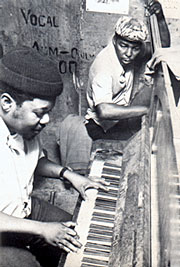
The Soul Jazzmen at work at Mamelodi.
___I stayed to hear their first number, beaty mainstream jazz with lots of dash. I felt a pat on the shoulder -- Tommy Masemola of Batsumi had joined me.
___"Tom," I said, "why is that young saxplayer of your's climbing onstage? It's not his turn."
___"Oh God," Tom groaned, "just look at him."
___Temba has very drunk. His stabilisers couldn't handle the high tide and read "TILT". He reeled up the steps on rubber legs. He was a mess -- dirty shirt torn and twisted up, buttons in the wrong holes, no socks, only one shoe, his belt screwed through only half the tabs in his baggy grey flannels. He carried a silver tenor sax on the tag round his neck.
___He made it to the top of the steps. He peered about, set a bearing on the nearest mike and sailed towards it. He reached the mike, stopped, turned, positioned himself in front of it and heaved the sax up towards his face. But the momentum thus generated threw him off balance and he staggered back out of control, reeled forward in overreaction, finally lurched himself stable. He lifted the sax and blew... but ridiculous noises came out the end: a raucous out-of-key screech that didn't fit anywhere and went nowhere.
___The Preachers, laying down their brass sermon all the while, didn't know what to do. They began to make fun of him.
___"He was drunk this morning early when we called at his home to pick him up," said Tom. "So I fired him. It's not the first time, he does it often. We're fed up with him. Now he's come here under his own steam, and he's had more to drink on the way..."
___People in the crowd were laughing at Temba now, but he took it as acclaim and bowed grotesquely. The whole crowd laughed. He stopped, glared at them. He waved his arms, sax dangling, shouting at the mike. Tom laughed, everyone laughed at what he said, but I couldn't understand it, he was speaking Zulu.
___"What's he saying?"
___"He's swearing at everyone."
___The more he swore the louder they laughed and the angrier he got so the more he swore, until he was roaring in an inarticulate fury. Suddenly he stopped, grabbed the sax and began to play the same drunken noises.
___Ray Nkwe was onstage. He rushed at Temba and grabbed him by the arm and shirt, jerking him away from the mike, but the mike picked up Ray's voice:
___"You drunken tsotsi delinquent -- what do you think you're doing -- you've got no respect -- "
___Ray dragged him offstage and down the steps, Temba stumbling all the way, and then Ray gave him a mighty shove and he went flying, miraculously keeping his feet. They drew a big laugh and a round of applause. The Preachers hadn't missed a beat.
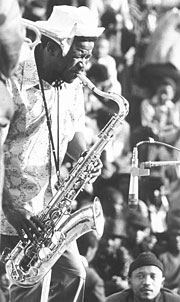
Winston "Mankunku" Ngozi, ace sax player with the The Cliffs.
___Temba wasn't finished yet. He fell straight into an argument with five young guys, all bigger and stronger than him.
___At first they refused to take him seriously and tried to laugh him off, but then he threw a wild punch at one of them with one arm and swung the sax with the other. The haymaker went wild and they wrested the sax from him easily. He tried another punch. They grabbed him and pinned his arms, but with surprising strength he shook them off and started punching again.
___Then they climbed in meaning business, and he vanished inside a mass of pumping arms and legs, which soon cleared, leaving Temba half-stunned on the ground with a coating of light brown dust and bits of dried grass all over his clothes, his face, in his hair. His saxophone lay nearby, without the mouthpiece.
___He staggered to his feet, aparently not hurt, and undaunted. He picked up the sax and trailed off, dragging the sax behind him in the dust, leaving behind the remains of his shirt and his other shoe.
___Tom watched sadly. Still Temba wasn't finished. He lurched into a pretty girl, leered some beery suggestion right in her face. She laughed and pushed him away, but her man didn't laugh, he took offence. He also took the saxophone in both hands, lifted it high and smashed it down to the ground almost on Temba's foot. The sax buckled and half the keys flew off. Temba didn't move.
___The man politely handed him the twisted silver remains. Temba took it and stared at it dumbly as the couple moved on. Then he dropped it and went off carelessly to look for another bottle.
___"That's that," said Tom. "Well, he's in good company. Half our best talent goes that way. He could have been good... now he's finished. Where will he get another saxophone?"
___"Here's Ray."
___"Au, Tom, that tsotsi of your's..."
___"No, he is not my tsotsi anymore, I fired him this morning. I didn't bring him here. But I'm sorry."
___"No, never mind. Keith we need some police to control this crowd."
___"I arranged for two contingents to be here, but they haven't turned up. I'd better go and fetch them."
___"Yes, look at the barrier fence." A few thousand people were putting their weight on it, and it was leaning over crazily, not taking the strain well. Terry and Stan crouched behind it over their consoles, looking tense, also not taking the strain too well.
___I went to look for Sol Rachilo, and found him behind the stage. I asked him to clear the people from the fence when the number ended. It ended and he sprang up onto the stage and took the mike.
___"Listen to me, you folks there on the fence -- yes, that's right, you there -- if you push any harder you're going to squash the sound engineer and smash all his equipment, and then you won't be able to hear anything, so get back please -- GET BACK FROM THAT FENCE PLEASE -- THE PREACHERS WON'T PLAY TILL YOU GET OFF THAT FENCE... yes, that's right people, move back..."
___Gradually they moved back, but in the process a small eddy of fans washed over the steps, clogging them.
___Three bright-eyes urchins found a good seat on top of the piano, but they didn't stay there long -- a big double bass player lifted all three off with one swoop of his arm and dropped them six feet to the trampled grass below. They landed on all fours like cats, without bumping each other, and sprang away, shouting with laughter.
___I resumed my stroll to the gate. I'd moved about 20 yards when I found myself staring at three trendy townships lasses leaning against a van drinking beer. I was staring especially at one of them -- tall and shapely in a beige kaftan, she had fine features and a great smile, and an amazing wig: blond hair spilled over her chocolate shoulders down to her waist.
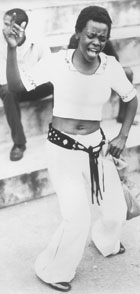 ___She caught me staring and smiled. "Hi, do you want some of my beer?"
___She caught me staring and smiled. "Hi, do you want some of my beer?"
___I walked over. "Just a sip." I sipped, they giggled.
___"Take a photograph of us?" she asked.
___"Oh, please?" they begged.
___"Sure," I said, and backed off to focus while they struck a zany, tipsy pose. I backed off some more, into the back of a big man wearing flannels and a dirty white vest. We both swung round. His face was two feet away, but his enormous belly was right against me.
___"Hey, man, who're you pushing there?" he said.
___"Sorry," I replied, "I didn't see you."
___His eyes widened. "You didn't see ME?" He put his arms round his huge gut and shook it like a big jelly. "You didn't see THIS?"
___I was embarrassed. "No, I was walking backwards."
___"Backwards?" He shook his head. "You mustn't walk backwards man, you must walk FORWARDS, otherwise you can't see where you're going, don't you know that?" And then you bump into people. Now you just take a photograph of this belly of mine." He wobbled it again.
___So I had to take one of him too, while the three girls shrieked with laughter at me, and I could feel myself flushing to the roots. I took some more shots and said goodbye.
___"Goodbye," the girls trilled, still giggling.
___I hadn't gone far when a flamboyant young guy stepped in front of me, puffing out his chest.
___"What you doing here, man?"
___"Listening to music, taking photographs."
___"Take a photograph of me then." He struck a ridiculous, mocking pose.
___"No -- you're too ugly."
___He'd never heard anything so preposterous. He roared with laughter, thumped his chest: "UGly? I'm beautiful, man, I'm BEAUTiful, you hear?" He moved on still laughing.
___By the time I'd survived the three men who called me "baas" (boss) and added that it was short for bastard, the two Black Power kids who asked me when I was leaving -- "No, not Mamelodi -- South Africa", several other heavies, some drunk and amorous ladies and scores of demands that I take people's photographs, and had finally reached the gate, I was feeling a bit stretched.
___There were two stolid black cops on guard at the gate, both wearing heavy forces-issue overcoats in the hot sunshine -- the only cops in the ground, and I'd been promised dozens.
___"We're in control here, baas," they assured me. But in fact they were standing there like a couple of dummies without any clue about the racket that was going on right under their noses. I didn't see it either, but those concerned had been watching out for me, and everything was clean by the time I got there.
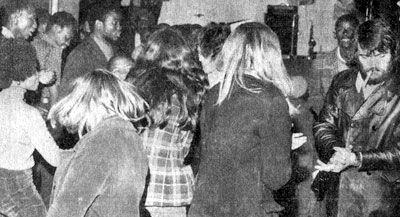
This happy picture at one of our concerts was published on 4 June 1974 by The Vaderland, an Afrikaans-language pro-government daily newspaper, under the headline: "Young whites take Soweto by the horns -- Piebald dancing... even on Sundays".
__"When things are dull in the city," went the story, "white girls and boys go to Soweto to let their hair down to the beat of the soul rhythms of Africa.
__"Such 'jive sessions' are a kaleidoscope of contrasts: blonde hair in long strings, sweating black faces; white pulses fluttering in time to the throb of the music, with black bodies dancing along...
__"It's the music that calls them, say the whites.
__"The rhythm that throbs in Soweto is urgent: it demands complete abandonment, and the young whites love to give themselves to it.
__"Most city people only hear snatches of this wild throbbing at those record stores which sell Bantu music. But it's at the 'sessions' that the thing enslaves them.
__"Maybe it's when the wildly screaming music is echoed in the wild dancing of thousands of black and brown bodies that the attraction reached into peak..."
__And so on.
__A quarter of a million Afrikaners saw the pictures, read the story, and many of them wrote outraged letters to editors, and to Prime Minister John Vorster, who was one of the newspaper's directors.
__A furious Vorster commissioned a special police inquiry to investigate this illegal racial mixing -- exactly what apartheid was supposed to prevent.
__We had our "story" prepared, witnesses primed, and we managed to spin the cops. They recommended to Vorster that his newspaper be censured for irresponsible reporting.
__In fact the newspaper was right, that was exactly what was happening. We were lucky not to get ourselves jailed -- plenty of others were, or worse.
___The arrangements were primitive. Instead of turnstyles with counters, there was a big corrugated iron gate. Four of the agency men were more or less keeping the stream on a one-by-one basis, tearing each ticket and giving back half. It wouldn't get any busier than this, and they seemed to be coping. I went to my car and drove to the back gate, which was barred and chained. A guard unlocked it and I left the stadium. I spent the next hour searching for and arguing with policemen, till I'd raised a force of about twenty. I followed their van back to the stadium.
___Inside again, a face appeared at my window and a deep, familiar growl said; "Hi, brother!"
___"Jake, hi!"
___"I've been looking for you everywhere, man!"
___"Why, what's going on?" My favourite question.
___"No, bad things are going on here, terrible! You see, the way it is..."
___"Let me park the car first."
___"Yes, park the car." He climbed in behind me and went on talking. "You see, those bums from the agency, they are robbing you badly!"
___"Yes? How?"
___"The ones at the gate, they are keeping the tickets, not tearing them and giving back half, and then they send them outside again to the queues at the ticket offices, and sell them again there, and again also maybe -- as often as they like. Three for them, one for you, maybe."
___"That's very greedy," I said.
___"Very very greedy. And also there are three holes in the fences where the people are coming in. You must tell those police you brought to send guards to the holes." We were out of the car now and moving towards the main gate.
___"They'll just stand at the holes and charge half price," I said. "But yes, I'll tell them." We caught up with the police, and Jake told them in Sotho. Two went to each hole.
___"How did you find all this out?" I asked him.
___"Friends saw and called me, then I saw too."
___"How long have you been here?"
___"About half an hour."
___"That was pretty quick, Jake, thankyou."
___Someone ran up, caught at my sleeve: Ray's teenager son. "My father wants you at the stage."
___"Oh... will you tell him I'll come as soon as I can, in four minutes?"
___"Yes." He ran away.
___We reached the main gate. As expected, everything was as it should be. Tickets were being torn and halves handed back. I couldn't see anyone plying the queues outside.
___The two ticket takers showed me thick wads of ticket halves. Jake and I went looking for David, their main man, and found him in the second box office. I went inside.
___It was dark, hot and smelly, and there was barely room for the two of us behind the counter. I closed the door behind me.
___"How's it going in here?"
___"Hot work. I'm relieving this man while he's relieving himself."
___He laughed. I looked outside through the bars. It was a hot dusty scene of sunlight and shadow, and hot dusky faces in the shadows, with one big face in the middle, a hand pushing a note across the scratched, greasy counter towards me, and the bars striping everything black. David took the money and gave the man a ticket, and the next, and the next. I didn't say anything. At length he looked up at me and for a second our gazes caught and held, then he looked back at the counter.
___"How many people do you think there are inside now?" I asked.
___"I can't say offhand. More than ten thousand." He didn't stop working.
___"I'd say more like fifteen thousand."
___"Possibly. They tell you about the holes in the fences?"
___"Someone told me."
___"I sent him."
___"I don't think so."
___"Many people came in. We could do nothing. We are all too busy here. I asked the police to go, but they said they had been told to stand here at the gate."
___"Not more than a thousand got in that way," I said. We both knew it was more than that. "There's a car going to Johannesburg soon. Will you take a ticket count and sub-total the cash so that they can take it with them? I'll take the rest from you tonight. Just leave yourself as much now as you started with -- R50."
___"I can have it ready in about 10 minutes -- most of the tickets are already in hundreds, and the money too."
___There was no car going to Johannesburg, but 10 minutes later I was walking with Jake, a sack full of money in my hand, through a mob of drunks towards my car. We reached it without trouble, and I drove round the back of the stand and then over the grass to behind the stage where the musician's vans were grouped.
___I was very pleased I'd driven there and not walked. Everyone seemed to be thunderously drunk. Several tried to kamikaze the car. The uproar was awesome, and I had a keen headache.
___"Let's sit in here for a while with the doors locked," I said.
___He laughed. "Alright brother."
___But then there was a rapping on the window. Ray. That's right, he'd wanted me. I opened the back door for him, he got in. I told him what had happened and he sent some of his people along to watch the agency men.
___"Are Terry and Stan still alive?" I asked.
___"Yes, but the crowd is terrible there on the rails. There are three police there and two more at each end of the stage, but they can't do much."
___"By the way, what did you want me for?"
___"Ah -- the cheques, to pay the bands."
___I gave them to him and he got out and hurried away. We smoked for awhile, and decided to go see the sights.
___The noise was monstrous. The music was very loud in order to rise above the crowd -- at least half of them at any moment were shouting at each other as loud as they could, and blacks have got huge voices for yelling across valleys with.
___Jake met some friends and stopped to chat. I wandered on alone, feeling bludgeoned by the racket. Suddenly I felt a thump on the back -- on the same spot, but gentler this time. Lefifi, grinning at me. He shouted something, but I didn't catch it and shook my head, frowning. I crouched and he craned to shout in my ear: "Hi! Can we play again?"
___"No!" I bawled back.
___"Why?"
___"There's only an hour left and two bands to play!"
___"What?"
___"ONE HOUR, TWO BANDS!"
___"But it's our home crowd!"
___"What?"
___"HOME CROWD!"
___"Sorry, no!"
___"But..."
___I bawled in his ear: "If you can persuade one of the other bands to stand down for you, yes -- otherwise no!"
___He nodded, grinned wryly, slapped me on the shoulder and went off to try.
___I spied Jeff's head and shoulders in clear air above the mass of people in front of the stage and for some demented reason I decided to join him. I started to scramble through the crowd.
___I felt someone tug at my arm and suddenly a fury of accumulated abrasion swept through me and I had to fight not to turn and smash into whoever it was, which would surely have been the death of me. I turned slowly to face a sweaty head a foot from mine, wreathing me in reeking fumes. It was a certain pianist, now very drunk.
___He shouted, but I didn't hear. He yelled in my ear -- more fumes -- and it was the same question: "Can we play again?"
___"No!"
___"Why?"
___"No time!"
___"What?" Still the fumes.
___"NO TIME!"
___"But just one number!"
___My turn: "What?"
___"What?" That was cheating!
___"No!"
___"But just one..."
___"NO!"
___"But..."
___"Fuck off!"
___"What?"
___"FUCK OFF!!" I roared at him, my hackles right up. He went off muttering, wearing a deeply wronged look. Someone stumbled into me and I shoved him aside. He rounded on me: "Who're you pushin!"
___"You, you stupid drunk bastard!"
___He backed off, amazed. I caught myself and remembered where I was -- Christ I'd better watch it... With my scalp prickling I worked my way back to the vans.
___The second last set ended and moved offstage. Jake and his all-star one-week-old band climbed the steps. Sol was at the mike trying to announce them, but the huge groundswell of noise from the crowd defeated him and he gave up.
___Jake took a mike for his sax, guitarist Allen Kwela plugged into a big Marshall amplifier, young Victor Ntoni took a mike for his double bass, Pat Matshikiza sat at the piano on the blue plastic milk crate that had served all day as a piano stool, Nelson Sibeko got behind the drums. They tried to balance, then shrugged and got going.
___The final half-hour was chaos. There were people milling around the stage dancing, yelling, gesticulating, crowding the musicians. The police had given up. The crowd was in a demonic frenzy -- gyrating, hurling cans and bottles indiscriminately in the air.
___I stood on the railings at the back of the stage taking photographs. I have no idea what the new band's big debut sounded like -- the music was going the other way, and I was probably too bludgeoned to have been able to tell anyway. But afterwards they said it had been a great success, the crowd had loved them and they were all very happy.
___At six o'clock the sun lowered itself behind the winter veld and the sky dimmed. Ray and Sol both rushed onto the stage and grabbed mikes.
___"Stop!" they yelled. "That's all -- goodbye!"
___Ten minutes later it was dark. The crowd vanished, a harrowed Terry and Stan disassembled, packed and left with lightning speed, the last of the bands drove off and the stadium was deserted, the stage bare but for the hired piano and the upturned milk crate stool.
___I dragged my feet through the inches-deep litter that covered the entire front half of the ground, walked across the track and climbed the steps to the top of the stand. I looked back through the night towards the stage. A full moon split the darkness at the eastern horizon, blood red through the gathering evening smog. I watched it rise, and found I was not alone. Someone started to play the piano, though I couldn't see who it was -- I could hardly make out the stage in the darkness. He was a good pianist, with an easy, fluid style, and a tune I hadn't heard before. It was beautiful.
___As soon as the whole magic disc of the moon had risen I climbed down, walked to my car and drove home with the money, leaving the day's best music to an empty stadium.
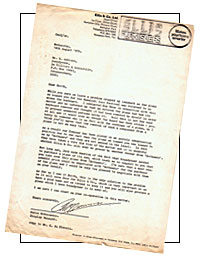 Ellis, August 1974
Ellis, August 1974
Dear Keith,
A problem has cropped up inasmuch as the piano we loaned you for the Mamelodi Jazz Festival was returned to us minus the keyboard. I contacted Ray Nkwe in connection with this matter and he informed me that he noticed the piano had had its keyboard removed and thought it had been removed by myself in order to prevent unwanted persons using it. Well this is not the case at all -- as you know I wasn't there. It seems as though the board has been stolen -- probably by someone who is au fait with the workings of a piano, as I think you'll agree that the removal of such a component from a piano is not an easy one.
___As a result our company has been placed in an acutely embarrassing position due to the fact that the piano we loaned you was loaned to us by Bothners and they are not amused in the least. In fact they have taken a very dim view of the matter and it is doubtful whether Ellis will ever be graced by another favour from Bothners.
___Not long ago, Jack Hines made mention of the fact that you needed to purchase a piano for yourselves, which leads me to suggest to you that you take over this piano from Bothners. I'm sure that a most reasonable price could be negotiated with Bothners for the purchase of the piano and I would be only too pleased to negotiate with them on your behalf.
___As far as I see it, this is the only solution to the problem as it will save face for Ellis, which is very important as we have a good name and we intend to keep it and you will also procure a piano which I know you are in need of.
___I am sure I can count on your co-operation in this matter.
Yours sincerely,
Colin.
Colin never did tell me how he thought I could use a keyless piano.
Jake was already at the farm when I got home from Mamelodi that night. He was waiting with the driver of the car that had transported the band and their instruments.
___"He needs R10."
___"That's your business, Jake -- you're supposed to pay for transport out of the R200 I paid you this afternoon."
___"But you paid me a cheque, and I haven't got any cash."
___I couldn't refuse -- after all, I was carrying a sack full of money. I paid the driver and he left.
___"That's R10 you owe me -- and it's your turn to make the coffee. I'll cook up something to eat later."
___I still had one chore left to do, and when Jake came back with the coffee I'd emptied the sack onto the living room carpet. We stared at the jumbled pile of notes and coins.
___"Will you help me count it?"
___"Sure. How should we do it?"
___"Let's do it outside in the wind, then we'll only have to count the coins," I suggested, horrifying Jake. "Well at any rate we'll need a bottle of something." I fetched a bottle of wine and we counted the money there on the carpet.
___"... and we'll make another small pile of tens over here," I said.
___"What for?"
___"Us."
___"Hau!"
___"Jake, you saved us a lot of money this afternoon spotting that racket. It's payment for that, okay?"
___When we finished counting I halved our pile, gave half to Jake and then took one note back. "That's the ten rand you owe me."
___We'd kept it small, we weren't greedy. Others had been far greedier. There had been a bit more than R4,000 in the sack. There should have been at least R15,000.










